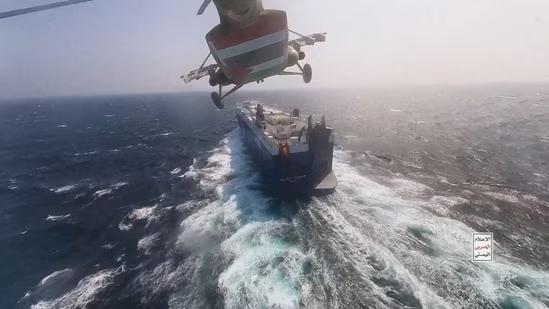Are the Houthis taking the Israel-Palestine conflict into new waters?
Last month, the Yemen-based Houthi group attacked many commercial vessels in the Red Sea with ballistic missiles and drones, forcing United States Navy ships in the region to respond. The attack was an expansion of the Houthis’ ongoing blockade on Israeli-linked shipping passing through the Bab-el-Mandeb, the strait offering entry into the Red Sea from the South. The Houthis, as part of Yemen’s protracted civil war, have fought Saudi-led forces for almost a decade. Yemen has been in turmoil for the good part of the 21st century.
 PREMIUM
PREMIUM It might appear puzzling then that Saudi Arabia not only refused to join a US-led ‘coalition of the willing’ (comprising US and European naval forces) to protect Red Sea shipping from Houthi attacks, but also advised ‘restraint’ to Washington. This puzzle is at the heart of the current crisis in the Red Sea — the latest theatre in the unfolding conflict in West Asia precipitated by Hamas’ October 7 terror attack and Israel’s high-casualty bombing campaign in Gaza. . The Houthis’ principal state rival in the last eight years has been Saudi Arabia, which heads a coalition mission called Operation Restoring Hope (with UAE, Bahrain, Qatar, Egypt and others) backing Yemen’s internationally recognised government in exile.
How have the Houthis worked in the past?
Controlling most of the Yemeni territory, the Houthis are sustained in no small part by Iranian funds and arms, adding a second layer of political objectives for the group, outside of those of the civil war. A Houthi attack on Saudi interests serves both their own domestic cause in Yemen and Iran’s objectives against Riyadh by proxy. It is only natural then, given Yemen’s geography and a commanding view of the Red Sea’s southern choke point, that attacking commercial shipping has also been an effective instrument of war for the Houthis.
What purpose does targeting commercial shipping serve?
Given the vast number of affected countries when international shipping is targeted, an attack on even one ship acts as a geopolitical shape-charge, forcing states to first protect (by either cutting off shipping through that route temporarily or undertaking more expensive re-routes), and then mitigate (through the collective application of naval power). Even as the latter plays out, it is the former which serves the Houthis’ political objective as the markets react to immediate developments, creating the political and economic pressure necessary on the targeted state.
Open-source intelligence reports show that a majority of Houthi attacks have been against Saudi-linked shipping especially since 2017, however, Israel too has been significantly affected by Houthi activity around the Bab-el-Mandeb, prompting Tel Aviv to join naval exercises with the US and UAE, following the Abraham Accords — a series of US facilitated agreements normalising relations between Israel and UAE, Bahrain, Morocco, and Sudan.
This time around, Israel is the principal targeted state given that the new objective of Houthi maritime warfare is to increase the international cost of the war in Gaza, according to a New York Times report published after the initial Houthi strikes in the Red Sea. This overarching political characteristic of the Houthis’ Red Sea attacks is also what sets them apart from the Somali pirates, the senior non-state threat in the Red Sea. For the latter, the objective has been largely mercantile, seizing vessels for monetary sustenance and vitality. While the former too has trained its guns on economic targets — the Houthis also targeted Saudi Aramco facilities in Riyadh and Jeddah across 2021 and 2022, sending oil prices soaring — targeting commercial shipping has been more means than end.
The new regional context for Houthi attacks
While Saudi Arabia has been a front-line state in the civil war in Yemen, years of monetary and military investment without effective victory, fresh risks to its oil exports, as well as the Houthis’ ability to withstand a war of attrition, have pushed Riyadh to now extricate itself from the war. Hence, even as Riyadh repaired its fractured relationship with Tehran through a Beijing-facilitated rapprochement in March, it had all but closed in on a peace deal with the Houthis themselves, by December. The Saudis were betting on a new West Asia, pushing the envelope by considering normalised relations even with Israel before October 7.
Hence, the lingering momentum of the Abraham Accords resulted in a new Arab modus vivendi. Their reaction to Israel’s Gaza campaign has been critical but restrained. On the other hand, the alarming civilian death toll in Gaza and growing Arab public opinion against Israel has meant that these states have indicated little willingness to join US-led coalitions seeking to punish anti-Israel actors (save Bahrain, no Arab state has thus far joined Washington’s Operation Prosperity Guardian in the Red Sea).
Situate this against Riyadh’s unwillingness to abandon its rapprochement with Iran despite Tehran’s hostile rhetoric against Israel and the US, and there is abundant evidence to show that as the Houthis step up attacks against Israeli and American targets in the Red Sea, Saudi Arabia may only stand by.
For Sana’a, or the Houthis, it is about displaying their willingness to do what Arab states cannot —and respond militarily to Israeli aggression in Gaza, through a low-cost, high-value maritime campaign. They are helped in considerable part by the ongoing twin detente (Saudi-Houthi, Saudi-Iran). Arab states, in return, shall express concern and offer criticism (given the adverse effects on their own shipping), but shall not join military action against the Houthis, as the effect of the group’s campaign ultimately bolsters pressure on Israel to end the war.
What is India’s position?
India could easily join the older anti-Somali piracy coalition due to its relatively non-political nature and a global naval cooperative (largely) easily stitching itself together. In the Houthi case however, India’s options are more limited, given the inextricable political character of the coalition being built by Washington, the reluctance of most Arab states, and India’s own shifts in stance over Israel’s war in Gaza — from hesitating over a ceasefire call to now supporting it.
Even as it stands by Israel on the question of fighting terror, it cannot abandon the Global South on Palestine generally and ceasefire specifically. Two India-linked vessels, MV Chem Pluto and MV Sai Baba, were targeted by drone strikes in late December, and the US embassy spokesperson told Mint that the US welcomed “other countries, including India, in joining us to defend the freedom of navigation in the region’s vital waterways, including by participating in Operation Prosperity Guardian.” India, however, has been cautious about accepting this. Given that the unfolding Red Sea crisis bears strong overtones of having spilt over from the Gaza conflict, the Indian Navy can mainly (and thus far, solely) focus on humanitarian efforts and rescue.
In a way, India’s main option is to now push for a ceasefire on its own, to prevent further harm to shipping lines that link to key Indian ports. The future of this crisis shall depend on the tolerance threshold of states affected by Houthi attacks on their ships, as much as it shall on Israel’s own choices in Gaza.
Bashir Ali Abbas is a Research Associate at the Council for Strategic and Defense Research, New Delhi, and a South Asia Visiting Fellow at the Stimson Center, Washington DC. Views expressed are strictly his own.
Continue reading with HT Premium Subscription
Daily E Paper I Premium Articles I Brunch E Magazine I Daily Infographics Subscribe Now @1199/year Already Subscribed? Sign In Share this article Share Via Copy Link
Share this article Share Via Copy Link - Red Sea
- Drones
Disclaimer: The copyright of this article belongs to the original author. Reposting this article is solely for the purpose of information dissemination and does not constitute any investment advice. If there is any infringement, please contact us immediately. We will make corrections or deletions as necessary. Thank you.
Title:Are the Houthis taking the Israel-Palestine conflict into new waters?
Url:https://www.investsfocus.com









